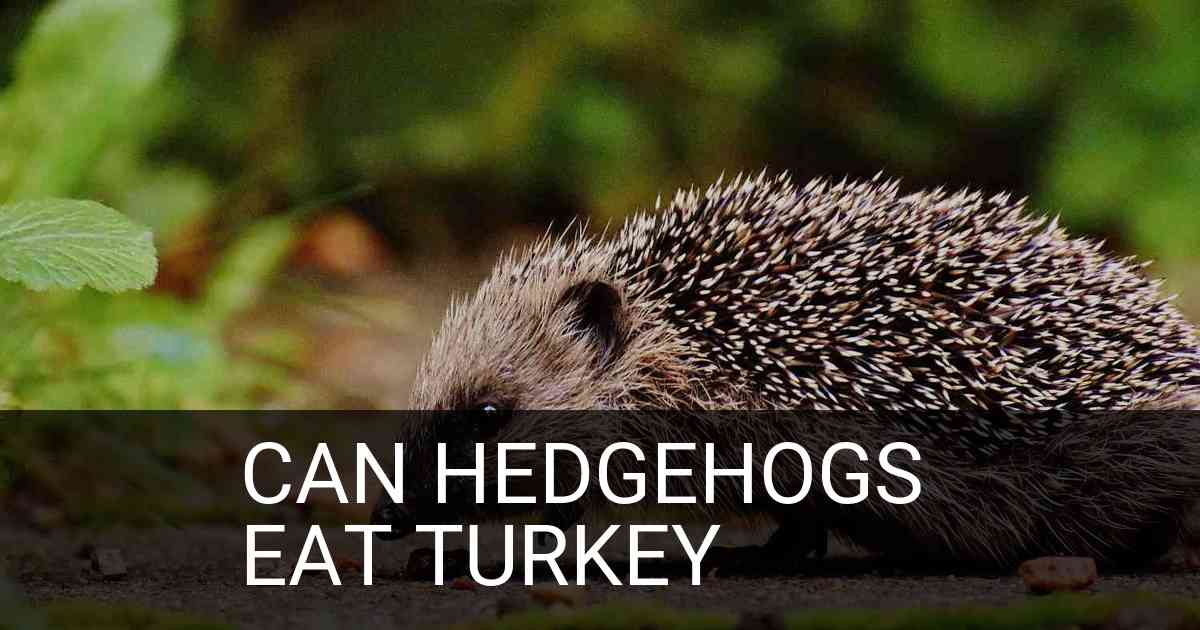
Do you have a pet hedgehog and are considering adding turkey to their diet? If so, you’ve come to the right place! In this article, we will discuss whether or not it is safe for your hedgehog to consume turkey. We’ll also cover topics such as nutritional benefits and potential risks associated with feeding your pet hedgehog turkey. By the end of this article, you should have all the information necessary to make an informed decision about adding turkey to your hedgehog’s diet.
Can Hedgehogs Eat Turkey?
Yes, hedgehogs can eat turkey. However, it is important to feed your hedgehog only lean cuts of cooked turkey and to avoid any seasonings or marinades that may contain unhealthy ingredients. Additionally, only offer small amounts of turkey as part of a balanced diet. Too much protein can be difficult for a hedgehog’s digestive system to process.
Nutritional Benefits of Feeding Your Hedgehog Turkey
Turkey is an excellent source of lean protein for your pet hedgehog. It also provides some essential vitamins and minerals including iron, zinc, calcium, and vitamin B12. These nutrients are important for keeping your hedgehog healthy and active.
Potential Risks Associated with Feeding Your Pet Hedgehog Turkey
- Sodium: Cooked turkey contains high levels of sodium which can be dangerous if consumed in large amounts by a hedgehog.
- Cholesterol: Like humans, too much cholesterol can be bad for your pet’s health so ensure you are feeding them lean cuts of cooked turkey.
- Bones: Bones from raw poultry (or other animals) should never be given to a hedgehog as they can cause choking or internal injuries.
The Benefits of Feeding Hedgehogs Meat
Hedgehogs are small, insect-eating animals that require a varied diet to remain healthy and thrive. Meat is an important part of the hedgehog’s diet, as it provides essential nutrients such as protein, vitamins, minerals, and fat. Here are some of the benefits of feeding your hedgehog meat.
Protein
Meat contains high levels of protein which is an essential macronutrient for proper growth and development in hedgehogs. Protein helps build muscle tissue and aids in several other bodily functions. It also helps keep your pet active and alert.
Vitamins & Minerals
Meat is a great source of vitamins and minerals such as iron, zinc, magnesium, phosphorus, B vitamins, selenium and potassium. These nutrients help support healthy immune systems in hedgehogs by providing them with antioxidants to fight off infection. They also help maintain strong bones and overall health.
Fats
Fat is another important nutrient found in meat that helps provide energy for hedgehog activity. Fats like omega-3 fatty acids, linoleic acid, arachidonic acid, etc. can be found in certain meats that are beneficial for hedgehog development.
Variety
By feeding your hedgehog different types of meats, you can ensure they get all the necessary nutrients from a variety of sources. This will prevent nutritional deficiencies or imbalances due to eating only one type of food over a long period time.
- Beef: Lean ground beef or steak cubes are both good choices for adding variety to your hedgie’s diet.
- Chicken: Cooked chicken pieces (without bones) make a delicious snack for your pet!
- Fish: Fish like salmon, whitefish, tuna or shrimp can be fed once or twice per week as treats or added into their regular meals with other proteins.
Foods to Avoid Feeding Hedgehogs
Hedgehogs are small, solitary animals that need a well-balanced diet in order to stay healthy. As such, it is important to be aware of the foods that should not be given to hedgehogs, as they can lead to health problems or even death. Here are some of the foods that should not be fed to hedgehogs:
- Citrus fruits: Citrus fruits like oranges and lemons contain high acidity levels which can cause digestive upset when consumed by a hedgehog.
- Avocado: Avocados contain toxins which can lead to serious illness or death in hedgehogs if ingested.
- Dairy products: Dairy products such as milk and cheese do not provide enough nutrition for a hedgehog, and may also cause diarrhea.
- Chocolate: Chocolate contains caffeine and theobromine which are both toxic to hedgehogs, causing vomiting and dehydration.
- Onions & Garlic: Onions & garlic have been known to cause anemia in hedgehogs due to their sulfoxides.
- Raw Meats: Raw meats can harbor parasites, bacteria, and other harmful organisms that could be fatal to your hedgehog.
- Junk Food: Like humans, junk food should not be part of a hedgehog’s regular diet. This includes chips, candy, and fast food items.
The Benefits of Feeding Cooked Chicken to Hedgehogs
Cooked chicken is an excellent source of protein for a hedgehog, and it can be used as part of a balanced diet. Here are some benefits of feeding cooked chicken to hedgehogs:
High Protein Content
Chicken is an excellent source of protein, and it provides essential amino acids that help with growth and development. The high-quality protein in cooked chicken helps hedgehogs build muscle and maintain healthy bones.
Easy to Digest
Cooked chicken is much easier for a hedgehog to digest than raw meat. This makes it the ideal food for older or sickly hedgehogs who may have difficulty digesting other types of proteins.
Variety
- A variety of meats can be offered within the same meal, such as turkey, beef, pork or fish.
- This helps ensure your pet receives all the necessary nutrients from their meals.
Convenience
Cooked chicken is convenient because it does not require any preparation before serving. You can easily purchase pre-cooked form at many grocery stores, making it easy to feed your pet without having to cook anything yourself.
Conclusion
In conclusion, hedgehogs can safely eat turkey in moderation. Turkey is a great source of protein that is necessary for the health and growth of hedgehogs. However, it should not be their main source of food and should only be given as an occasional treat. It is important to remember to always provide fresh and clean food with no additives or preservatives.
Additionally, any leftovers from cooked turkey should be refrigerated and discarded after two days at most. With proper care and feeding, your pet hedgehog will remain healthy while occasionally enjoying the taste of turkey!

